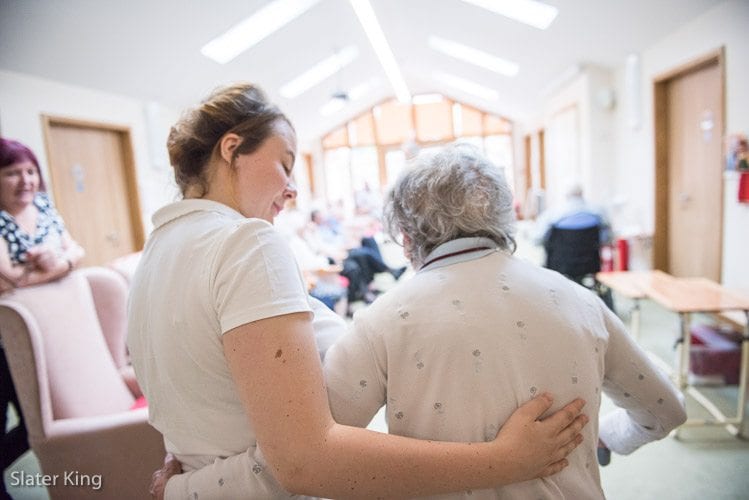Table of Content
We understand how challenging it can be to coordinate care for a loved one living with a memory disease. The following organizations provide services, support, and information to people whose lives have been touched by dementia. This competency guide aims to help educators and employers of direct careworkers choose high-quality DCW education and identify strategies to improve work environment in ways that support both learning and quality of care. Prospective caregivers are able to verbalize ways in which to orient client to reality, as needed. Abnormalities in thyroid-stimulating hormone levels require further workup to rule thyroid disease.

For nursing home residents, though, Montessori is more focused on enabling these individuals to keep the independence they still have. Studies show that the approach can result in increased feelings of self-worth, greater levels of engagement, and more communication with staff, family members, and fellow residents. Well, the concept of using the Montessori approach with dementia patients stems from the idea that these patients, like children, need individualized, sensorial experiences in order to thrive. Fortunately, most home care providers do not charge higher hourly rates for persons suffering from Alzheimer’s, vascular dementia, frontotemporal dementia, or other type of dementia.
Rule #2: Quality of care
There are high chances that a person with dementia will get proper nutrition when they are in a nursing home. When the person with dementia is at a premium nursing home, it also implies that relatives and friends can go back to their normal routines seeing that the ill person is in the right environment. It can be very stressful to leave a person who has late-stage dementia alone at home. On this note, it is important to note that nursing homes have undergone major transitions over the years.

The 61 pages of instruction to the surveyors in F309, Quality of Care, deserve a thorough review by facility staff. In this section, CMS provides an overview of dementia and behavioral health and defines behavioral intervention, person-appropriate care, and appropriate medication use in residents with dementia. J&J salespeople went hard after nursing home doctors and state-run institutions for the elderly, promoting the drug there quietly so as not to be noticed by the FDA.
Nursing Homes with Dementia Special Care Units Provide Better Quality of Care
By 1994, J&J found its replacement in Risperdal, and projected plans to sell Risperdal to tens of millions of Americans, generating $1 billion per year. A very small fraction of people suffer from schizophrenia, however, the only condition for which Risperdal was approved. Johnson & Johnson (J&J) makes over 90% of its money from prescription drugs and medical devices, and each drug has its own team of salespeople and elaborate marketing initiatives. Salespeople and manager incomes rely heavily on how much product they can push doctors to prescribe, according to an in-depth piece by Steven Brill on this company and the sordid history of Risperdal,America’s Most Admired Lawbreaker.

The long term care benefits offered by the VA depends on several factors. These variables include level of disability, income, as well as service-connected status. The VA has both state veterans’ homes and contracts with private nursing homes to provide care for veterans.
Children’s Book About Dementia
Those with early-stage Alzheimer’s or dementia may not need much assistance. However, it might be best to have a skilled caregiver present with them during certain times of the day, to ensure their safety and to help maintain their living conditions. Brain-imaging scans of older adults and persons with dementia reveal dramatically decreased uptake of glucose. Competency of staff to care for cognitively impaired residents is in surveyors’ bull’s-eye. Elder abuse lawyers at Pintas & Mullins report on a new treatment modality based in Phoenix, Arizona, coming out of a facility called Beatitudes. The advanced-dementia care center mirrors other, similar efforts to heighten the care of our nation’s dementia patients, such as the recently-featured Green House Project, and Chicago’s Pioneer Network.
For people who are both financially and medically eligible, Medicaid will pay for all their nursing home costs, which includes care costs and room and board. A diagnosis of dementia does not mean that a person is medically eligible for Medicaid, but a person with dementia who requires nursing home care would be medically eligible. Financial eligibility criteria are very restrictive, very complex and are discussed in detail on this page. In short, the applicant must have less than $2,000 in monthly income and less than $2,000 in assets. Unless married, they must surrender all their monthly income to Medicaid (except for approximately $20 to $100). In return, Medicaid will pay for the complete cost of their nursing home care for as long as they require it.
For regional and local cost differences within each state, use this interactive cost of assisted living / memory care map. Executive Home Care can place live-in caregivers in the home, giving late-stage Alzheimer’s or dementia patients an always-there resource they can rely on. The goal of providing care for early-stage Alzheimer’s and dementia patients is to maximize their independence and provide reliable, consistent help with routine household tasks, as needed. Seniors and disabled persons rely on Executive Home Care for professional in-home or in-facility caregiving. Our staff provides compassionate, reliable personal and companion care focused on enhancing everyday safety and independence.

The overuse and misuse of antipsychotics among nursing home residents with dementia is dangerous, rampant, and illegal. We urge anyone with a loved one suffering from dementia in a nursing home to be aware of the signs and symptoms of antipsychotic abuse. As dementia progresses, it may be prudent for the suffering person and their carers to think about alternative accommodation like nursing homes for dementia patients. For veterans with Alzheimer’s or other forms of dementia, the VA Health Care system offers assistance. Their dementia does not need to be related to their military service.
Abnormalities found in screening of liver enzyme levels require further workup to rule out hepatic disease. Abnormalities in complete blood cell count and cobalamin levels require further workup to rule out hematologic disease. This type of dementia is caused by significant cerebrovascular disease. The client suffers the equivalent of small strokes caused by arterial hypertension or cerebral emboli or thrombi, which destroy many areas of the brain.

Since you know them the best, don't forget to advocate for your dementia patient. Check on how they feel at the facility and look for signs that can attest to their comfort in living independently at the nursing home. You should also see if they have security systems in place, if their memory care facilities are providing support as promised, and if their long-term care plan is working.
In fact, study after study has shown that nursing home residents with cognitive impairments who receive recreation therapy demonstrate significantly improved depression levels, increased activity and alertness levels, and lowered fall rates. Yet, in most nursing homes, many residents access activity programs only occasionally, and those programs are not always suited to an individual’s preferences or even functional level. Many dementia patients prefer to stay in their homes with their families and hire in-health care providers. However, they may also opt for memory care facilities like nursing homes, adult daycare programs, adult family homes, and continuing care retirement communities.

You can bring your loved ones into care once they start requiring care services that only full-time caregivers can provide. However, when a dementia patient worsens and becomes dependent on round-the-clock care, the best decision would be to choose a nursing home. In an assisted living facility, 24-hour medical care from professionals can ensure your loved one's safety and health. Oversight of medication regimens by consistent staff who know their residents is an effective approach to avoiding unnecessary-drug citations. In honor of World Alzheimer’s Day, Pintas & Mullins would like to spotlight a particularly insidious and often-ignored problem.
Top 10 dementia care rules for nursing homes
Fortunately, families can receive free assistance finding, evaluating and touring different residences. Under F250, facilities can be cited when a resident with dementia lashes out at another resident and staff fail to evaluate the aggressive resident’s behavior. Resident-to-resident abuse is a huge problem in nursing homes, and your facility’s social services professionals should be integrally involved in evaluating the root cause of aggressive behaviors. Interventions should be established and continually monitored for effectiveness. The Pieces of the Puzzle project made on-unit, individualized activities the responsibility of every CNA.
A large majority of nursing home residents are affected by Alzheimer’s and other forms of dementia, making them vulnerable to abuse and neglect. Alzheimer’s is the sixth-leading cause of death in the United States, and unlike many other diseases ... There is a wealth of research showing a direct relationship between low staffing levels and high use of antipsychotics. If you have a loved one with dementia, you know that agitation and other troubling behaviors are patients’ efforts to communicate.

No comments:
Post a Comment